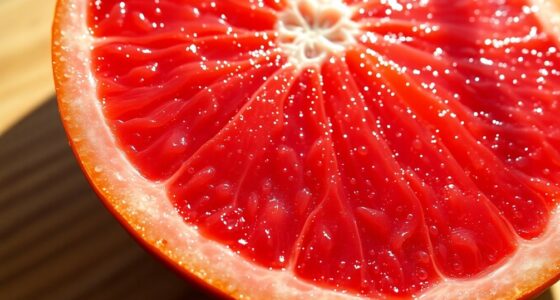Orange juice shouldn't be left unrefrigerated for more than two hours. If the temperature's over 90°F, you've got just one hour. Freshly squeezed juice spoils quicker due to no preservatives, making safety a big concern. It's easy for harmful bacteria to grow in warm environments. If any juice has been out too long, it's best to toss it. Want to know what to look for to tell if it's gone bad?
Key Takeaways
- Orange juice should not be left unrefrigerated for more than two hours to prevent spoilage.
- If the temperature exceeds 90°F, limit unrefrigerated time to one hour.
- Freshly squeezed orange juice is more prone to spoilage than pasteurized varieties.
- After opening, store-bought pasteurized juice should be consumed within 8-10 days.
- Always check for unpleasant smells or off-flavors before consuming orange juice.

When you leave orange juice out at room temperature, it's important to be mindful of how long it stays unrefrigerated, as this can significantly impact its safety and quality. Generally, you shouldn't leave any juice out for more than two hours. If the temperature exceeds 90°F, that timeframe drops to just one hour. This is crucial because harmful bacteria can grow rapidly in warm environments, turning your refreshing beverage into a health risk.
Fresh orange juice, especially when it's freshly squeezed, is particularly vulnerable. Without preservatives, it spoils faster than pasteurized options. If it's been out for more than two hours, you should definitely toss it.
Even though cold-pressed orange juice may seem like a healthier choice, it's not immune to spoilage either. The lack of preservatives and the fresh nature of the juice make it susceptible to bacterial growth, which can lead to serious food safety concerns.
When it comes to store-bought orange juice, the pasteurization process offers some protection. Unopened, pasteurized orange juice can be returned to the fridge if it's been left out for a little while. However, once you open that carton, your shelf life shrinks significantly. You'll want to consume it within 8-10 days to ensure you're drinking a safe product.
Even then, always check for signs of spoilage, like an unpleasant smell or off-flavors, before enjoying your glass of juice. While store-bought orange juice is more acidic, which generally helps in preventing spoilage, it can still ferment and develop off-flavors if left out for too long.
So you might think you're safe with that carton on the counter, but after just a few hours, you could be risking both taste and safety. It's essential to be proactive about food safety in your kitchen. If you've left your juice out for more than the recommended time, don't hesitate to throw it out.
The risk of harmful bacteria far outweighs the slight waste. Even if it looks fine, the bacteria can thrive without visible signs, making it a hidden danger. Ultimately, whether you're enjoying fresh orange juice or a store-bought version, keeping an eye on the clock is crucial.
The warmer it is and the longer it sits unrefrigerated, the more likely you're to encounter spoilage. So the next time you pour a glass and leave it on the table, remember those hours tick away quickly. Taking these precautions not only ensures you're enjoying the best flavors but also protects you from potential health risks associated with consuming spoiled juice.
Frequently Asked Questions
Can Orange Juice Go Bad if Not Refrigerated?
Yes, orange juice can definitely go bad if it's not refrigerated.
When left out, harmful bacteria can grow, leading to spoilage. You might notice signs like a bloated container, an off smell, or a strange taste, which means it's time to toss it.
Freshly squeezed juice spoils faster than pasteurized, so be cautious.
If it's been left out too long, don't risk drinking it—your health's not worth it!
How Long Does It Take for Orange Juice to Get Bad?
Imagine pouring yourself a refreshing glass of orange juice, but then you wonder, how long does it take for it to go bad?
Well, if you leave it out, you might be in for a nasty surprise. Typically, orange juice can spoil within a couple of hours, especially if it's fresh.
Watch for changes in color, smell, or even mold. Once you notice these signs, it's best to toss it to stay safe.
What Happens if I Don't Refrigerate Juice After Opening?
If you don't refrigerate juice after opening, it can spoil quickly.
Bacteria can grow, especially in fresh-squeezed orange juice, making it unsafe to drink after just two hours. Even store-bought varieties can develop off-flavors or ferment if left out too long.
You should always check for signs of spoilage, like an off smell or color changes. If you notice any, it's best to toss the juice to avoid health risks.
How Long Can OJ Stay Out of the Fridge Reddit?
When it comes to how long orange juice can stay out of the fridge, opinions vary on Reddit.
Many users suggest that pasteurized juice might be okay for a few hours, but caution is key.
Freshly squeezed juice spoils faster and should really be discarded after two hours.
If you're in a hot environment, consider cutting that time in half to avoid any unpleasant surprises.
Always trust your instincts when it comes to food safety!
Conclusion
In the end, it's best not to push your luck with unrefrigerated orange juice. Picture that vibrant, fresh glass sitting on your counter, slowly losing its zest as time ticks away. After just two hours, it can start to sour, inviting unwanted bacteria to join the party. So, next time you pour a glass, remember: keeping it chilled not only preserves its bright flavor but also keeps you safe from any potential tummy troubles. Cheers to that!
Cindy thoroughly researches juicing trends, techniques, and recipes to provide readers with practical advice and inspiration. Her writing style is accessible, engaging, and designed to make complex concepts easy to understand. Cindy’s dedication to promoting the advantages of juicing shines through her work, empowering readers to make positive changes in their lives through the simple act of juicing.
















